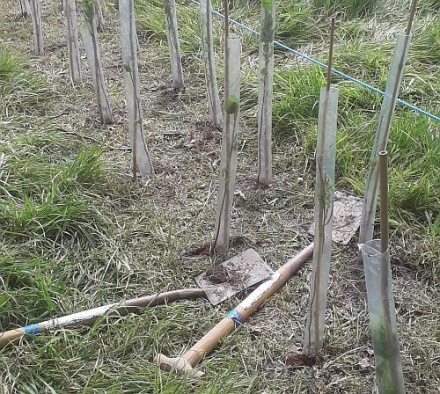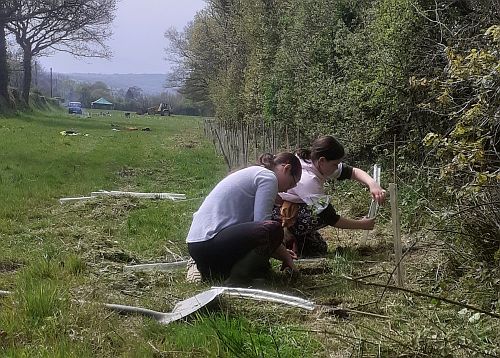South Hill Jubilee Orchard

On April 24th, volunteers were invited to help plant a sapling hedge alongside the new parish Orchard. Altogether, 15 people turned up to help for varying amounts of time, and we were able to plant more than 420 trees in just over 4 hours. Species included Rowan, Elder, Dog Rose, Crab Apple, Blackthorn and Hazel. Refreshments were provided and, after a damp start, the weather was kind to us.
On April 24th, volunteers were invited to help plant a sapling hedge alongside the new parish Orchard. Altogether, 15 people turned up to help for varying amounts of time, and we were able to plant more than 420 trees in just over 4 hours. Species included Rowan, Elder, Dog Rose, Crab Apple, Blackthorn and Hazel. Refreshments were provided and, after a damp start, the weather was kind to us.

The new hedgerow will form a boundary between the Jubilee Orchard and the new allotments, and a wildlife corridor along the internal boundary of the orchard.
A Grand Opening is planned at the Orchard on June 3rd as part of the South Hill Parish Jubilee Celebrations, with information for the public and entertainments for young and not so young.
Energy Crisis
Recent events have thrown into sharp relief the reasons why SHARE was formed by a group of concerned residents 7 years ago. Our mission statement, “Powering renewable energy into a secure and sustainable future for all”, set us on a path which saw the installation of 40kW of solar PV panels at Church Park, South Hill. To date this has generated 22.6MWh, saving 4.81tonnes of CO2 equivalent. Unfortunately the abolition of the Feed-in Tariff made further similar installations financially unviable. However, we have high hopes that in the near future it will be possible to have local energy networks, in which power generated locally can benefit local households directly through cheaper tariffs. Totnes Renewable Energy Society (Tresoc) are on track to deliver this in Totnes, and we are watching with interest.
Meanwhile, what can we as individuals do to reduce our energy usage (to save both money and CO2 emissions)? A recent post by Martin Lewis, the Money Saving Expert outlined ‘90 Ways to Survive The Cost of Living Crisis’, which includes many hints and tips for energy saving. The Consumers Association website, which.co.uk is also a good source of advice e.g. ‘Ease the squeeze: how to save on your energy bills’
The Hydro-power struggle
More recently, regulars will have read about our attempts to measure the generating potential of a small river in the parish. It seems we’re not the only ones to have our hopes dashed by the regulations and fees imposed by the Environment Agency. Tresoc have recently had to abandon their hopes for a hydro scheme on the River Dart, a much more promising project than ours, at a location which had historically generated electricity for the Dartington Estate in the 1930s. You can read about it here…
To quote Rupert Armstrong Evans of Evans Engineering (Water and Power engineers since 1810), “Decades of environmental legislation designed to protect rivers have inadvertently caught small domestic scale waterpower and watermills in their web and will kill them off in a few years if nothing changes.” Rupert’s home, Trecarrell Mill, a working mill for around 500 years, was one of the first to feed ‘green electricity’ into the National Grid. Rupert was upgrading it to produce enough electricity for around 30 homes when the EA imposed new conditions that rendered the project unviable. Trecarrell is only one of many historic water mills across the UK with the potential to become sources of renewable energy.